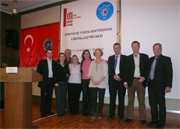Turkish Unions & UNI europa work to deal with postal liberalisation

Turkish Unions & UNI europa work to deal with postal liberalisation
Examples from all over the world have shown that postal liberalisation does not work.
UNI europa Post & Logistics, together with the Turkish Trade Union Haber-Is, organised a seminar on liberalisation of the postal sector in Ankara/Turkey from 10 to 11 February 2011. Two hundred members of the Turkish Trade Unions, together with representatives from NGOs and the government participated in the 2-day seminar.
Following the welcoming address of the CEO of PTT, the Turkish postal company, and a written message from the Turkish Minister of Communication, the first Panel began work by taking an overview of Europe. Jutta Steinruck, MEP from the S&D Group, Germany and Cornelia Berger, Policy Officer, UNI europa Post & Logistics, explained what was going on at the European level and the possibilities trade unions have within the European Institutions.
National examples from Germany, New Zealand, the Netherlands and the UK followed, all of which showed the same picture after a badly prepared liberalisation. The postal sector is faced with enormous job-cuts, a change in employment towards marginal or short-term contracts, outsourced work and a centralisation process, which leads to the closure of post offices. The mainstream form of competition in these countries is based on social dumping and Trade Unions have to prepare to try and avoid the worst by demanding a strong social regulation. One of the most important points is that it is not necessary to do privatisation at the same time as liberalisation and if it is then this leads to even more problems. Public companies are better at planning to deal with competition as the Swedish and New Zealand examples showed, therefore the CWU, UK is putting all its efforts into avoiding the privatisation of Royal Mail at the moment.
CWU, Ireland, the Communication Workers Union of Canada and Teskoop-Is, Turkey gave examples about how to campaign and lobby the topic at the national level and how to organise workers in multinational companies. Their examples gave a good overview about how Trade Unions have should prepare for liberalisation. It is important to start work on the new competitors in good time and to raise the topic in public. Local politicians and NGOs can be good partners in the fight towards saving postal services and towards getting a stronger social regulation.
Dominique Bailly, HR, La Poste, France and President of the Social Dialogue Committee of the postal services finalised the overview discussion by explaining the incumbents' problems and positions and the pressure imposed on them as a result of privatisation, the market opening and from the other competitors. He also underlined the importance of social dialogue to ensure good postal services and to safeguard the social conditions in the sector. The Italian case study gave an example of how to cope with the change from a company perspective, where the company invested in financial services and in social dialogue with the Italian Trade Union, brought Poste Italiana forward to a competitive and healthy company.
Neil Anderson, Head of UNI Post & Logistics, summarised the most important points of the 2-day seminar as follows: 1) organise the competitors; 2) adapt as unions for change; 3) do not privatise; 4) solve the problem of financing the universal services, and 5) ensure a strong social regulation. This should not only be good advice for the Turkish Trade Unions but also for all other postal Trade Unions throughout the world who are being faced with liberalisation. Turkey, as a candidate for membership in the European Union, will be pushed into liberalising their postal market sooner or later therefore UNI europa Post & Logistics is glad to have already had the chance to prepare and support Haber-Is on the impending challenges.

